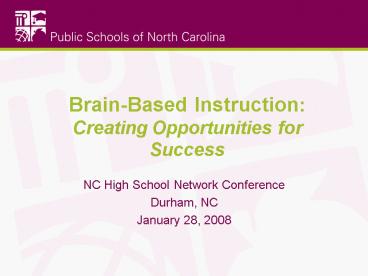BrainBased Instruction: Creating Opportunities for Success - PowerPoint PPT Presentation
1 / 18
Title:
BrainBased Instruction: Creating Opportunities for Success
Description:
The experiences children have profoundly affect the ... The brain's plasticity and resilience provide protection against early negative ... Marilyn Monroe ' ... – PowerPoint PPT presentation
Number of Views:181
Avg rating:3.0/5.0
Title: BrainBased Instruction: Creating Opportunities for Success
1
Brain-Based InstructionCreating Opportunities
for Success
- NC High School Network Conference
- Durham, NC
- January 28, 2008
2
This Mornings Food for Thought
From the moment a child gets out of bed in the
morning untilsafely tucked in at night, theres
one central mission the avoidance of
humiliation at all costs. We have to be so
careful not to subject them to public
humiliation. Dr. Mel Levine A Mind at a
Time
3
Resiliency
- The experiences children have profoundly affect
the way their brains are structured and the ways
they perform. - The brains plasticity and resilience provide
protection against early negative experiencesand
help overcome them. - Brain plasticity lasts throughout life.
4
What Do We Want?
- What we want is for
- children to know what to do when they dont know
what to do. - Sam Houston
- Director, NC Science, Mathematics, and Technology
Education Center
5
Movement
- Physical activity helps oxygenate the blood,
which in turn oxygenates the brain. - Sensorimotor skills and practice encourage muscle
memory. - Muscle memory can tie to academics.
Problem-solving is promoted through individual
and group physical activities.
6
Working With the Brain
- Creating a respectful, caring and
intentionally inviting learning environment is
the surest way to encourage student achievement. - William Puckey David Aspy
7
Key Principles of Brain-Based Learning
- Highly adaptable
- Pattern-seeker
- Social
- Innate search for meaning and connections
- Left Right Whole
- States influence learning
- The small stuff is big stuff
- Environment changes the brain
- Each brain is unique
- Memory is malleable
- Complex learningChallenge good, threat bad
8
WATER
- Water is essential to perfusion of oxygen
throughout the bodyand therefore maximized brain
function. - Recommended 10-12 glasses per day
- Water should be drunk to counteract caffeinated
beverages (and those that contain alcohol). - Nancy Byl, PhD (01/19/080
9
States
- Emotions are hardwired, common to all cultures
(Johnston 1999) - 6 Primaryjoy, fear, anger, disgust, surprise,
sadness - Many others are learnedcultural, less stable
- Anxiety, confusion, frustration, hope
- Some are merely physical states
- Hunger, depression
10
More About States
- Read your audiencechange states for your
benefitdont tell them youre going to do it,
just do it - Up and moving approximately every 20 minutes
- Attention span is age in minutes (up to age 15)
11
Framing
- Sets intentional bias
- Use to make things sound appealing and
interesting - Effort on the front endcan pay major dividends
12
Memory
- Filtered.99 normal, 75 ADHD
- Sensoryonly smell is hardwired
- Practice doesnt make perfect.
- Working MemoryChunks7/- 2
- Neurogenesismovement assists
- Long Term Memory3 Ms
- Music
- Movement
- Humor (Make em laugh.)
- PEG system
13
I cant memorize the words by themselves I have
to memorize the feelings. Marilyn Monroe
14
- Brain-compatible learning is acknowledging
the way the brain processes stimuli and then
designs activities, lessons, and units that
complement and work with these processes.
Steven Dunn
15
Wisdom from Marcia Tate
- If your students like you, there is nothing they
wont do for you. - If your students dont like you, there is nothing
they wont do to you.
16
Strategies
- Discussion
- Drawing/Artwork
- Games
- Graphic Organizers
- Humor
- Manipulatives/Hands-On
- Metaphors, Analogies, and Similes
- Mnemonic Devices
- MOVEMENT
- Music, Rhythm, Rhyme, Rap
- Projects
- Reciprocal Teaching/ Cooperative Learning
- Role Play
- Storytelling
- Visualization and/or Guided Imagery
- Visuals
- Technology
- Writing/Journaling
- Work Study
- Field Trips
From Worksheets Dont Grow Dendrites by Marcia
Tate and the work of Pat Wolfe
17
Last Minute Details
- Please fill out your evaluation before you leave.
- PowerPoint will be posted at http//community.lear
nnc.org/dpi/science. - For any handouts, please contact one of the
presenters. - Thank you for your attendance, attentiveness and
enthusiasm. We appreciate you!
18
Presenters Contact Info
- Eleanor Enthoven Hasse eehasse_at_dpi.state.nc.us
- K-12 Science (Secondary), Curriculum, Instruction
Technology Education - Ragan Spain rspain_at_dpi.state.nc.us
- K-12 Science (Secondary), Curriculum, Instruction
Technology Education - Benita Tipton btipton_at_dpi.state.nc.us
- K-12 Science (Secondary), Curriculum, Instruction
Technology Education































